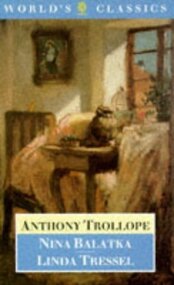
Most people don’t like change, and Trollope readers really hate it. Nina Balakta (1867) was an attempt to try something different, and Trollope published it anonymously in order to mark the departure from his familiar style. Reviewers quickly saw through his disguise, and the reading public were unimpressed. The original serialisation in Blackwood’s Magazine flopped, and the three-decker sold fewer than 500 copies. Consequently, the novel is one of Trollope’s least-known works. A terrible shame, say I, as Nina Balakta is one of his finest short novels.
Trollope wrote his story after a visit to Prague, in what was then Bohemia. The city was a hotbed of racial tension between Jews and Christians, and the problem there was much greater than in other parts of Europe. The Bohemians resented their Austrian rulers, and the fact that the Jews generally spoke German served to increase their unpopularity. This incendiary setting gave Trollope an idea for a tale of forbidden love.
Nina Balakta is the daughter of an impoverished and sickly merchant. The family’s fortunes rely on her making a good marriage, and it seems as though their future is secured when Nina’s cousin, the charmless Karil Zamenoy, asks for her hand in marriage. Much to her Aunt Sophie’s disgust, Nina declares herself to be in love with Anton Trendellsohn, a wealthy Jewish merchant whose father owns the house in which they live. Although Pa Trendellsohn is willing for them to live there rent-free, he stipulates that Balakta must surrender the deeds so that the house isn’t seized by bailiffs after his death. Determined to cause a rift between the lovers, the Zamenoys hide the deeds to make it appear that Nina is deliberately deceiving Anton. Having experienced nothing but hatred and deceit from Gentiles, Anton tests Nina to the limits of her endurance to be sure that she really loves him.
Unlike most of Trollope’s other fiction, there is no authorial voice to guide the reader, and it’s impossible to know who to believe until the very end. There is much less emphasis on character descriptions, with no caricaturing or nominative determinism. Overall, the style is much sparser and cleaner, and almost devoid of humour. It does suit the changed setting, however; the ebullient wit of the Barsetshire Chronicles would be misplaced in a novel with such a serious theme.
Trollope has been criticised for having made Anton Trendellsohn a phlegmatic and almost unlikeable character. His prickliness is understandable, though, given the rabid anti-semitism to which he is subjected. Aunt Sophie describes his love for Nina as “filthy”, proclaiming “Oh, I hate them! I do hate them! Anything is fair against a Jew.” She threatens to lock up her niece and to have Anton sent out of Bohemia. Karil Zamenoy cannot understand how Nina could possibly “prefer the love of a Jew to the love of a Christian”. He thinks she should be a “good girl” and do her family’s bidding. Alas, Trollope is guilty of racial stereotyping, which makes for uncomfortable reading in places. That caveat notwithstanding, his views are more enlightened than those of some mid-nineteenth century writers. Marriage between a Christian and a Jew would have been unacceptable to the vast majority of Victorian readers. Jews had been granted full citizenship only seven years before Trollope started writing Nina Balakta and they were by no means assimilated into society. Through such a bold story line, Trollope was exposing the hypocrisy of the vocal anti-semites, and challenging the muted prejudices of Middle England. Trendellsohn at one point laments: “It is, I believe, the creed of a Christian that he may deal dishonestly with a Jew, though the Jew who shall deal dishonestly with a Christian is to be hanged.”
Perhaps Trollope’s readers resented being made to feel uncomfortable; or maybe they just wanted him to crack on with more forensic studies of English society. Just three weeks after finishing Nina Balakta, Trollope heeded their wishes and embarked upon The Last Chronicle of Barset. Mind you, he got his own back, killing off two of the nation’s favourite characters and concluding the story in such a way as to preclude all possibility of a sequel. I thoroughly enjoyed Trollope’s Bohemian rhapsody and wish there had been more opportunities for him to explore his new voice.
Nina Balakta by Anthony Trollope